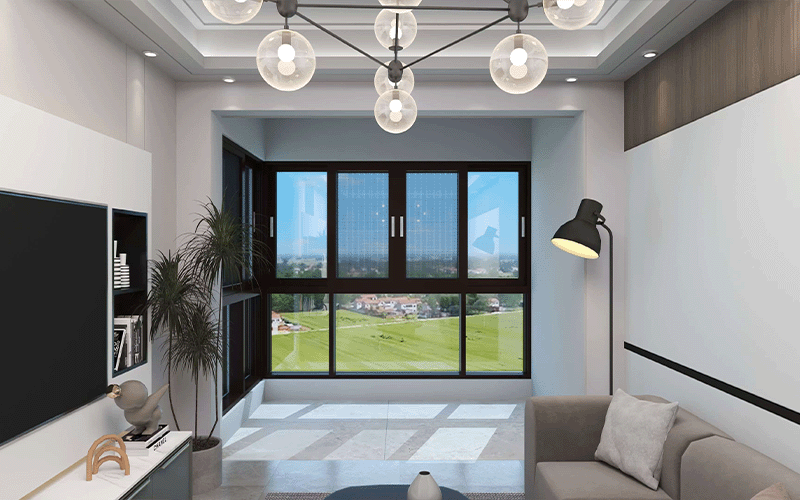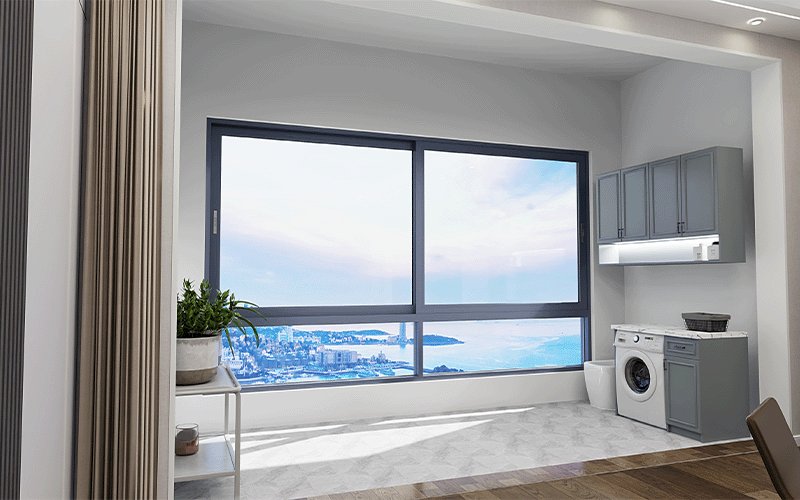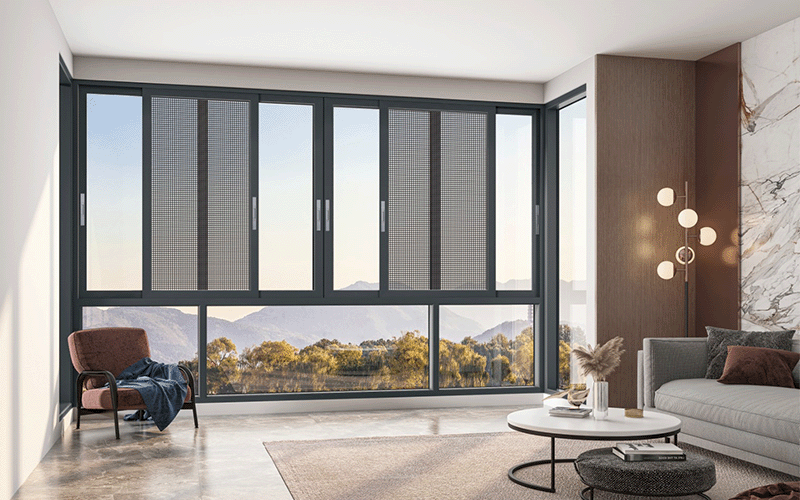In today's modern architecture and home renovation trends, window systems are no longer just about allowing light and ventilation into a space; they also significantly impact energy efficiency, aesthetics, and indoor comfort. Among the numerous options available in the market, broken bridge aluminum windows (also called thermal break aluminum windows) are gaining traction as a superior alternative to ordinary aluminum windows. But what exactly sets them apart? And more importantly, which one is the better investment?
What Are Broken Bridge Aluminum Windows?
Broken bridge aluminum windows, also known as thermal break aluminum windows, are specifically designed to enhance thermal insulation and improve energy efficiency. The term “broken bridge” refers to a non-metallic barrier — usually made of polyamide or polyurethane — inserted between the inner and outer aluminum frames. This design breaks the thermal conductivity of aluminum, which is naturally a highly conductive material.
Key Features:
● Thermal Break Structure: The non-metal separator (the "broken bridge") reduces heat conduction.
● Enhanced Sound Insulation: Often integrated with double or triple-glazed insulating glass.
● Durable Powder-Coated Aluminum: Excellent resistance to corrosion and weather.
● Modern Aesthetic Appeal: Suitable for contemporary home design and high-end architectural projects.
Jingyu Broken Bridge Sliding Window
What Are Ordinary Aluminum Windows?
Ordinary aluminum windows are made from single-frame aluminum profiles without any thermal break. They are widely used in commercial buildings and budget-conscious residential projects due to their cost-effectiveness, lightweight structure, and ease of installation.
Key Features:
● Single Aluminum Frame: Conducts heat and cold easily.
● Lower Initial Cost: Ideal for large-scale installations on a budget.
● Minimalist Design: Compatible with various modern window frame designs, though with limited insulation properties.
Core Differences: A Detailed Comparison
Let's examine both options across critical performance metrics.
Thermal Insulation
Broken Bridge Aluminum: Incorporates thermal break technology, dramatically reducing heat transfer between indoors and outdoors. This leads to better indoor temperature stability and energy savings in heating/cooling.
Ordinary Aluminum: Poor insulation; aluminum easily conducts external heat or cold into the room.
Soundproofing Performance
Broken Bridge Aluminum: Typically combined with insulated glazing units (IGUs) and rubber sealing strips that significantly reduce outdoor noise.
Ordinary Aluminum: Less effective at blocking noise, especially if used with single glazing.
Energy Efficiency
Broken Bridge Aluminum: Helps in reducing monthly utility bills by lowering the reliance on HVAC systems. Often meets or exceeds energy-efficient window standards.
Ordinary Aluminum: Lacks thermal break, increasing energy consumption during hot summers or cold winters.
Condensation Resistance
Broken Bridge Aluminum: Because of the thermal barrier, these windows reduce interior window condensation — a common cause of mold and wall damage.
Ordinary Aluminum: Tends to accumulate condensation easily in cold climates.
Price & Long-Term Value
Broken Bridge Aluminum: Higher initial investment, but superior performance leads to long-term savings and higher property resale value.
Ordinary Aluminum: Lower upfront cost, but may require more maintenance and higher energy bills over time.
Design Versatility & Customization
Both window types support a wide range of modern window styles, including casement windows, sliding windows, and folding windows. However, broken bridge aluminum frames often offer more customization options, such as multi-layer coatings, decorative trims, and hidden hinges.
Quick Comparison Table: Broken Bridge vs. Ordinary Aluminum Windows
|
Feature |
Broken Bridge Aluminum Windows |
Ordinary Aluminum Windows |
|
Thermal Insulation |
Excellent – uses thermal break technology |
Poor – conducts heat easily |
|
Soundproofing |
High – combined with insulated glazing units |
Low – limited sound isolation |
|
Energy Efficiency |
Energy-saving, lowers HVAC costs |
Less efficient, higher energy consumption |
|
Condensation Resistance |
Good – resists interior condensation |
Poor – prone to moisture buildup |
|
Initial Cost |
Higher upfront investment |
Lower initial cost |
|
Long-Term Value |
Higher resale value and energy savings |
Lower long-term value |
|
Design Options |
Highly customizable (colors, finishes, opening styles) |
Fewer customization options |
|
Application Suitability |
Ideal for homes, villas, and energy-efficient buildings |
Suitable for warehouses, budget housing |
|
Durability |
High – weather-resistant powder coating |
Moderate – can corrode over time |
|
Sustainability |
Supports green building goals, compatible with low-E glass |
Limited environmental performance |
Application Scenarios: Where Each Type Performs Best
Broken Bridge Aluminum Windows:
● High-rise buildings in cold or hot climates
● Passive house or green building projects
● Urban apartments with high noise levels
● Custom homes with energy efficiency goals
● Coastal areas where corrosion resistance is essential
Ordinary Aluminum Windows:
● Warehouses or industrial spaces
● Budget housing developments
● Interior partitions or enclosed balconies
● Temporary structures
Environmental Impact and Sustainability
More and more building projects today are following sustainable design practices. Broken bridge aluminum windows, due to their energy-saving potential, contribute positively to a building's environmental footprint. Some advanced systems even integrate low-E glass and recycled aluminum frames, aligning with eco-friendly certification requirements like LEED or BREEAM.
Why More Professionals Are Switching to Broken Bridge Aluminum?
Many window manufacturers and construction companies now favor broken bridge aluminum systems due to their performance, durability, and design flexibility. With growing awareness of energy savings and building code regulations, their adoption is accelerating across markets.
The Rise of High-Performance Aluminum Windows in Modern Architecture
As design trends continue to favor minimalism, large glass facades, and sustainability, aluminum windows with thermal breaks are becoming a standard in both residential and commercial applications. Architects and developers are prioritizing custom aluminum window solutions that balance form with function.
From smart homes to energy-conscious office buildings, high-performance window systems are no longer a luxury — they're a necessity.
Choosing the Right Window for Your Project
When deciding between a broken bridge and ordinary aluminum windows, consider the following:
● Climate: Extreme temperatures require better insulation.
● Budget: If long-term savings matter more than upfront cost, choose thermal break designs.
● Aesthetics & Functionality: Are modern features like concealed drainage or automatic locks needed?
● Regulatory Requirements: Some cities mandate energy-compliant window systems.
Looking for Cost-Effective Custom Solutions?
If you're exploring high-performance aluminum windows that combine design and durability, Jingyu offers custom options that meet your project needs. Whether you're looking for casement, sliding, or folding windows, we deliver high-quality, cost-effective solutions with a focus on craftsmanship and service. Our systems are ideal for everything from residential villas to commercial buildings, all tailored to suit your specifications.
Thermal Break Aluminum Windows for Living Room/Bedroom
Conclusion
In summary, broken bridge aluminum windows outperform ordinary aluminum windows in nearly every performance metric — from thermal insulation and soundproofing to energy efficiency and durability.
If your project emphasizes energy savings, sustainability, and modern aesthetics, broken bridge aluminum windows are the way to go. While they may come at a higher initial price, the long-term value they offer in terms of comfort, savings, and property appeal makes them a smart choice for modern buildings. However, for low-budget, low-priority spaces, ordinary aluminum windows may still serve a functional role.
For those seeking dependable performance with tailored design, Jingyu is a reliable partner. We offer custom aluminum windows in casement, sliding, and folding styles, combining high-quality materials with efficient solutions for residential and commercial projects alike. Browse our existing range of aluminium windows or contact us at jingyu@jy-aluminum.com for more details.



